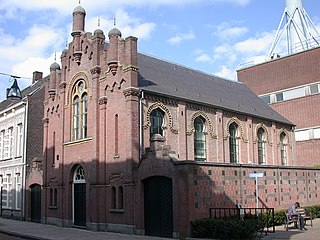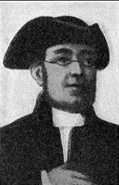
Reform Judaism, also known as Liberal Judaism or Progressive Judaism, is a major Jewish denomination that emphasizes the evolving nature of Judaism, the superiority of its ethical aspects to its ceremonial ones, and belief in a continuous search for truth and knowledge, which is closely intertwined with human reason and not limited to the theophany at Mount Sinai. A highly liberal strand of Judaism, it is characterized by lessened stress on ritual and personal observance, regarding halakha as non-binding and the individual Jew as autonomous, and great openness to external influences and progressive values.
Liberal Judaism is one of the two WUPJ-affiliated denominations in the United Kingdom. It is smaller and more radical in comparison with the other one, the Movement for Reform Judaism. It is considered ideologically closer to American Reform Judaism than it is to the British Reform movement. As of 2010 it was the fourth largest Jewish religious group in Britain, with 8.7% of synagogue-member households.

Reform Judaism is one of the two World Union for Progressive Judaism–affiliated denominations in the United Kingdom. Reform is relatively traditional in comparison with its smaller counterpart, Liberal Judaism, though it does not regard Jewish law as binding. As of 2010, it was the second-largest Jewish religious group in the United Kingdom, with 19.4% of synagogue-member households. On 17 April 2023, Reform Judaism and Liberal Judaism announced their intention to merge as one single unified progressive Jewish movement. The new movement, which may be called Progressive Judaism, will represent about 30% of British Jewry who are affiliated to synagogues.

The history of the Jews in the Netherlands began largely in the 16th century when they began to settle in Amsterdam and other cities. It has continued to the present. During the occupation of the Netherlands by Nazi Germany in May 1940, the Jewish community was severely persecuted.

The World Union for Progressive Judaism (WUPJ) is the international umbrella organization for the various branches of Reform, Liberal and Progressive Judaism, as well as the separate Reconstructionist Judaism. The WUPJ is based in 40 countries with 1,275 affiliated synagogues, of which 1,170 are Reform, Progressive, or Liberal and 105 Reconstructionist. It claims to represent a total of some 1.8 million people, both registered constituents and non-member identifiers. The WUPJ states that it aims to create common ground between its constituents and to promote Progressive Judaism in places where individuals and groups are seeking authentic, yet modern ways of expressing themselves as Jews. It seeks to preserve Jewish integrity wherever Jews live, to encourage integration without assimilation, to deal with modernity while preserving the Jewish experience, and to strive for equal rights and social justice.
As a result of the expulsions from Spain in 1492 and Portugal in 1496, as well as the religious persecution by the Inquisition that followed, many Sephardim left the Iberian peninsula at the end of the 15th century and throughout the 16th century, in search of religious freedom. Some migrated to the newly independent Dutch provinces which welcomed the Sephardic Jews. Many of the Jews who left for the Dutch provinces were crypto-Jews, persons who had converted to Catholicism but continued to practice Judaism in secret. After they had settled in the safety of the Netherlands, many of them 'returned' fully to practice of the Jewish religion.

The history of the Jews in Tilburg, Netherlands, did not start until 1767, when a Jewish citizen of the town Oisterwijk was given permission to settle in Tilburg, despite objections from the city council. Several Jewish families also succeeded in settling in Tilburg soon afterwards in 1791.

Isaac Aboab da Fonseca was a rabbi, scholar, kabbalist and writer. In 1656, he was one of several elders within the Portuguese-Israelite community in the Netherlands who excommunicated Baruch Spinoza.
The Nederlands-Israëlitisch Kerkgenootschap (NIK) is the umbrella organisation for most Ashkenazi Jewish communities in the Netherlands, and is Orthodox in nature, while to be described as traditional in outlook. The expression Orthodox, is for the Dutch situation at least, of a later date than the existence of the congregations that make up the NIK and the NIK itself. The Rabbi of the NIK is Rabbi Dr. Raphael Evers. In total, the NIK has some 20 rabbis actively working in 18 congregations throughout the country, serving some 5,000 Jews.

Beit Ha'Chidush (BHC) is a Jewish congregation founded in 1995 in Amsterdam, Netherlands. It was founded by Jews, many of which were expats, with secular and religious backgrounds who wanted to create a welcoming, inspiring and renewed Jewish congregation. BHC is an independent modern and progressive community where anyone with a Jewish background, either paternal or maternal, is welcome. People with a non-Jewish partner are more than welcome to attend the services together with their partner. BHC is a community based on equality and inclusiveness and welcomes individuals of all genders and sexual orientations.

The Portuguese Synagogue, also known as the Esnoga, or Snoge, is a late 17th-century Sephardic synagogue in Amsterdam, completed in 1675. Esnoga is the word for synagogue in Judaeo-Spanish, the traditional Judaeo-Spanish language of Sephardi Jews.

The Portugees-Israëlitisch Kerkgenootschap (PIK) is the community for Sephardic Jews in the Netherlands. Sephardic Jews have been living in the Netherlands since the 16th century with the forced relocation of Spanish but above all Portuguese Jews from their home countries due to the Inquisition. Nowadays some 270 families are connected to the PIK, also sometimes called PIG, which stands for Portugees-Israëlitische Gemeente.
Samuel Pallache was a Jewish Moroccan merchant, diplomat, and pirate of the Pallache family, who, as envoy, concluded a treaty with the Dutch Republic in 1608. His antecedents fled to Morocco during the Reconquista. He was appointed as an agent under the Saadi Sultan Zidan Abu Maali. Pallache would travel to the newly-independent Dutch Republic to discuss diplomatic terms with the Dutch against their mutual enemy, the Spanish. Pallache died in the Netherlands, brought there due to the intervention of his ally, Maurice of Nassau, whom helped Pallache when he was arrested by the Spanish.

Aron Mendes Chumaceiro was chakam (rabbi) of Curaçao, Dutch West Indies. He received the various rabbinical degrees at the celebrated bet ha-midrash Ets Haim. In 1848 he was awarded the royal gold medal for the best sermon in the Dutch language. When the Sephardic synagogue of Amsterdam proposed to elect him preacher in the vernacular, it met with strenuous opposition, Portuguese being the only language, except Hebrew, used in the synagogue. When in 1852 Chumaceiro was elected first ab bet din, he succeeded in overcoming the opposition to Dutch, and soon established a reputation as one of the foremost pulpit orators in the Netherlands. In 1852 he edited the first Dutch Jewish weekly, Het Israelietisch Weekblad. In the same year he was elected head of the bet ha-midrash Ets Haim.
Amsterdam has historically been the center of the Dutch Jewish community, and has had a continuing Jewish community for the last 370 years. Amsterdam is also known under the name "Mokum", given to the city by its Jewish inhabitants. Although the Holocaust deeply affected the Jewish community, killing some 80% of the approximately 80,000 Jews at time present in Amsterdam, since then the community has managed to rebuild a vibrant and living Jewish life for its approximately 15,000 present members. Six of Amsterdam's mayors were Jewish. Job Cohen was runner-up for the award of World Mayor in 2006.

Judaism is a minority religion in Australia. 99,956 Australians identified as Jewish in the 2021 census, which accounts for about 0.4% of the population. This is a 9.8% increase in numbers from the 2016 census.

Beth Israel Synagogue is the synagogue of the Aruban Jewish community, located in Oranjestad, Aruba. Beth Israel Synagogue is an independent congregation with a liberal style similar to Reform Judaism or Conservative Judaism.
Liberal Judaism may refer to:
The Dutch Israelite Religious Community of The Hague is the Ashkenazi Orthodox Jewish community in The Hague and is a member of the Nederlands-Israëlitisch Kerkgenootschap (NIK).

Rabbi Harry Martin Jacobi was a rabbi in the United Kingdom, where he came in 1939, via The Netherlands, as a refugee from Nazi Germany. He has been described as "a formative figure in the founding and growth of Liberal Judaism in the UK and Europe".













